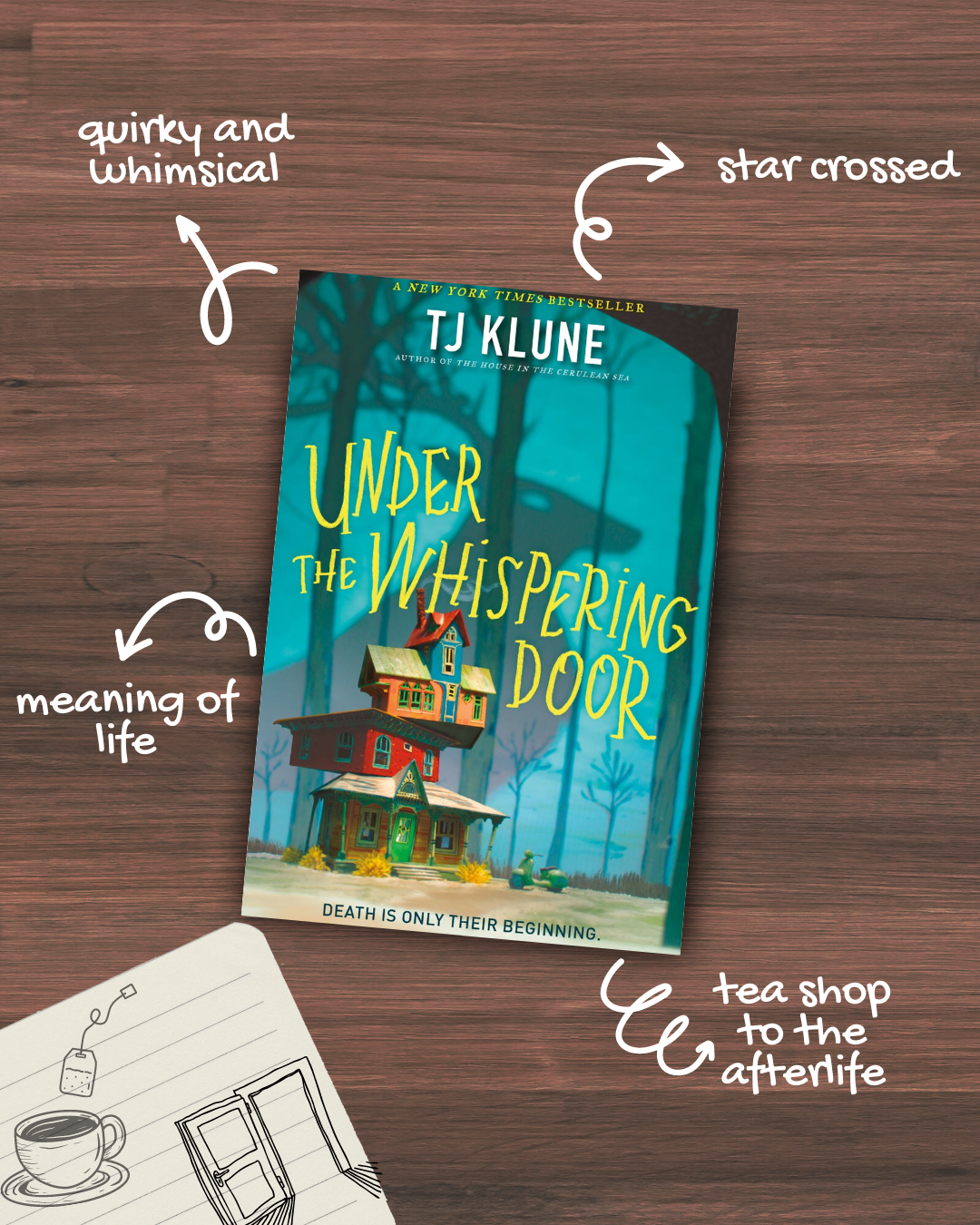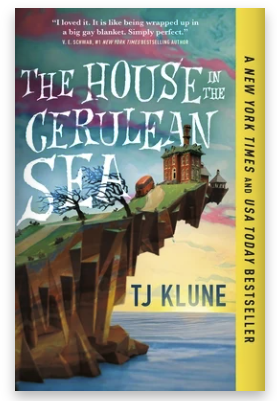Welcome!
This post contains affiliate links for which I may receive compensation. You can click here to read my full FTC Affiliate Disclosure policy.
Book Review: Under the Whispering Door

Rating: ![]()
Age Rating: 13+
After reading The House in the Cerulean Sea, I could not wait to get my hands on T.J. Klune’s next novel. I love the atmosphere Klune creates, leaving me feeling uplifted and hopeful. Under the Whispering Door is no exception. This novel is heartwarming and thought-provoking as it looks at death and our journey to the other side within a cozy tea house nestled in the woods.
In this Under the Whispering Door review, we will explore this book that focuses on self-discovery, love, and the beauty of life (and death). Through the eyes of the protagonist, Wallace Price, we will uncover the importance of embracing change and the transformative power of relationships that transcend our mortal existence. So, join us as we embark on a heartfelt journey that will leave you pondering the profound connections that shape our lives, both in this world and beyond.
Tropes in this Book
- Mentor/Mentee
- Grumpy/Sunshine
- Found family
- Redemption
Introduction to Under the Whispering Door
Under the Whispering Door is a contemporary fantasy novel that tells the story of Wallace Price, a big-time lawyer with a cold, calculating demeanor. In a unique twist, his journey begins after his death. When Wallace dies and wakes up at his funeral, he meets Mei, a mysterious reaper who has come to take him onwards.
Mei brings Wallace to a shabby chic little tea house in the middle of the forest. This magical shop serves as a way station for the newly departed to come to terms with their deaths before taking the next step to the mysterious beyond. Here, Wallace is introduced to Hugo, the ferryman, whose job is to help him get used to the idea of being dead before he steps through the final door.
This tea shop is a unique place where the living and the dead can interact and where souls can find peace and closure before moving on. In addition to Mei, a sarcastic and passionate young woman rather than the familiar hooded figure with a scythe, the shop is inhabited by Hugo’s grandfather, Nelson, and dog, both of whom are ghosts.
To say that Under the Whispering Door is a typical “death and the afterlife” narrative would be unfair. This novel is an emotional rollercoaster that explores complex existential and philosophical questions.
It goes beyond asking about the meaning of life and delves into the meaning of the afterlife. Wallace has to face his past mistakes, confront his deepest fears, and learn to let go of his attachments to the living world. Along the way, he forms meaningful relationships with the other souls he meets, including Mei and Hugo.
The novel also serves as an honest exploration of grief, examining the experiences of those who pass through the tea shop and those they leave behind. It does not aim to fix the remaining sadness but leaves space for it.
As Wallace recognizes that he wanted more out of life, he learns that it is never too late to start becoming a different person. The relationships he forms, particularly with Hugo, highlight the importance of doing kind acts for no reason and embracing life’s tender, beautifully ordinary moments.
Main Characters and Their Development
Wallace, a middle-aged man who has long embraced a solitary and emotionally detached life, finds himself navigating the great unknown of the afterlife. To guide him on his journey is Mei, a kind-hearted reaper who acts as his guide and confidante. Mei’s tender presence adds emotional depth to the narrative, as she gently challenges Wallace’s long-held beliefs and encourages him to face his fears and regrets. Together, their poignant and often humorous interactions forge a deep connection that helps Wallace break free from the emotional barriers he’s built.
When arriving at the tea house, Wallace and Mei meet with Hugo, the soul ferryman who welcomes them to a charming tea shop that serves as a sanctuary for souls in transition. Hugo’s friendship with Wallace highlights the power of finding common ground and understanding, despite their differing pasts. Hugo’s own struggles with loss and grief bring nuance to his character, and his interactions with Mei and Nelson, the lovable ghostly grandfather, create a tapestry rich in emotion and thematic depth.
Nelson, the warm-hearted soul residing at Charon’s Crossing Tea and Treats alongside Hugo, Mei, and the endearing ghostly dog Apollo, brings laughter, wisdom, and vulnerability to the group. Though he has been gone for years, Nelson’s commitment to ensuring Hugo’s happiness and well-being keeps him tethered to the shop. His unwavering support and gentle guidance become instrumental in Wallace’s journey, helping him uncover the true value of kindness and empathy in the afterlife.
Through their shared experiences, they learn that even in the afterlife, opportunities abound for growth, redemption, and the forging of deep, meaningful relationships.
Life, Death, and the Afterlife
Under the Whispering Door is a novel that delves deep into the human psyche and explores some of the biggest questions of human existence. The novel’s central theme revolves around life, death, and the afterlife, and it offers a unique perspective on what happens after we die.
The afterlife depicted in the novel is not a simple binary choice between heaven and hell but rather a complex and multifaceted realm where souls can find closure, healing, and peace. The novel suggests that death is not the end but rather a transition to another form of existence. It also touches on the concept of reincarnation, hinting at the possibility of a cyclical existence.
The novel’s exploration of the afterlife is not limited to the metaphysical realm, but it also touches on the impact of death on the living. It shows how death can catalyze change and force people to confront their fears, regrets, and desires.
Redemption and Personal Growth
The power of personal growth and the potential for change, even after death, is beautifully showcased. Wallace’s transformative journey reminds us of the importance of forgiveness and second chances, prompting readers to reflect on their own lives and relationships.
This heartfelt novel dives deep into the theme of personal growth, illustrating how we can overcome fears and prejudices to become better, more empathetic versions of ourselves. Wallace’s character arc is a shining example of this transformation, as he evolves from a cynical, closed-off individual into someone who learns to open his heart and connect with others.
Love and Friendship
Wallace’s relationships with Mei, Hugo, and Nelson are a testament to the universal human need for connection and support. The novel shows how love can transcend the boundaries of life and death and help people find meaning and purpose.
Moreover, the novel explores different forms of love, including platonic, romantic, and familial. It shows how these various forms of love can coexist and complement each other and how they can all contribute to a person’s sense of fulfillment and happiness.
The Power of Memory
Finally, Under the Whispering Door explores the concept of memory and its role in shaping our identities and experiences. The novel suggests that memories are not just a record of the past but also a tool for healing, learning, and growth.
The afterlife depicted in the novel is a place where the souls can revisit their memories and confront their regrets or traumas. Wallace’s arc is a testament to the idea that memory can be a source of strength and resilience, even in the face of death. It shows how revisiting memories can help us gain new insights and perspectives on our lives and help us move forward with a renewed sense of purpose and clarity.
Final Thoughts
Under the Whispering Door is a novel that deserves to be read and cherished. The book tackles big questions with humor, heart, and intelligence. Its characters are relatable and memorable, its themes are universal and profound, and its writing style is engaging and evocative.
T.J. Klune has crafted a literary gem that will stay with you long after you finish reading it. We highly recommend this novel to anyone who loves cozy fantasy, romance, and stories that make you laugh and cry.
If you found this review helpful, you can check out the book at Bookshop.org here and support local bookstores along the way!

Other Books By This Author
Contact Us
info@snugbookworm.com

